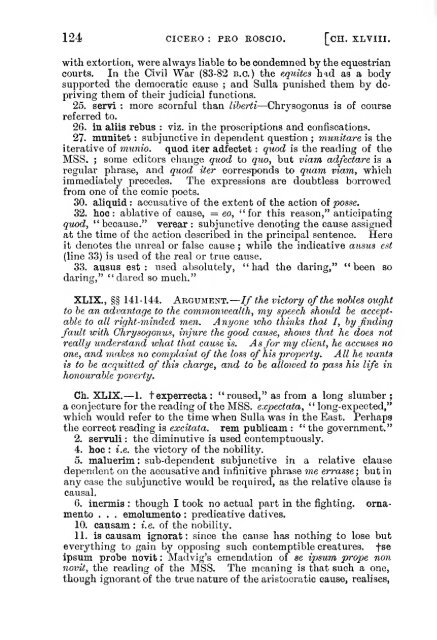Pro S. Roscio Amerino
Pro S. Roscio Amerino
Pro S. Roscio Amerino
You also want an ePaper? Increase the reach of your titles
YUMPU automatically turns print PDFs into web optimized ePapers that Google loves.
124 CICERO : PRO ROSCIO. [CH. XLVIII.<br />
wibh extortion, were always liable to be eondemned by the equestrian<br />
courts. In the Civil War (83-82 b.c. ) the equites had as a body<br />
supported the democratic cause ; and Sulla punished them by depriving<br />
them of their judicial functions.<br />
25. servi : more scornful than liberti—Chrysogonus is of course<br />
referred to.<br />
26. in aliis rebus : viz. in the proscriptions and confiseations.<br />
27. munitet : subjunctive in dependent question ; munitare is the<br />
iterative of munio. quod iter adfectet : quod is tlie reading of the<br />
MSS. ; some editoi's ciiange quod to quo, but viam adfectare is a<br />
regular phrase, and quod iter corresponds to quam viam, which<br />
immediately precedes. The expressions are doubtless borrowed<br />
from one of the comic poets.<br />
30. aliquid : accusative of the extent of the action of posse.<br />
32. hoc : ablative of cause, = eo, " for this reason," anticipating<br />
quod, " because." verear : subjunctive denoting the cause assigned<br />
at the time of the action described in the principal sentence. Here<br />
it denotes the unreal or false cause ; while the indicative ausus est<br />
(line 33) is used of the real or true cause.<br />
33. ausus est : used absolutely, " had the daring," " been so<br />
daring," " dared so much."<br />
XLIX., §§ 141-144. Argument.— If the victory ofthe nobles ought<br />
to be an advantage to the commomvealth, my speech should be acceptable<br />
to all right-minded men. Anyone ivho thinks that I, by finding<br />
fault with Chrysogonus, injure the good cause, shoivs that he does not<br />
really understand what that cause is. Asfor my client, he accuses no<br />
one, and makes no complaint of the loss of his property. All he wanta<br />
is to be acquitted of this charge, and to be allowed to pass his life in<br />
honourable poverty,<br />
Ch. XLIX.— 1. texperrecta: "roused," as from a long slumber<br />
a conjecture for the reading of the MSS. e.cpectata, " long-expected,"<br />
which would refer to the time when Sulla was in the East. Perhaps<br />
the correct reading is excitata. rem publicam " : the govemment."<br />
2. servuli : the diminutive is used contemptuously.<br />
4. hoc : i.e. the victory of the nobility.<br />
5. maluerim : sub-dependent subjunctive in a relative clause<br />
dependent on the aocusative and infinitive phrase me errasse ; but in<br />
any case the subjunctive would be required, as the relative clause is<br />
causal.<br />
6. inermis : though I took no actual part in the fighting.<br />
mento . . . emolumento : predicative datives.<br />
oma-<br />
10. causam : i.e. of the nobility.<br />
11. is causam ignorat: since the cause has nothing to lose but<br />
everything to gain by opposing such eontemptible creatures. -f-se<br />
ipsum probe novit : Madvig's emendation of se ipsum prope non<br />
novit, tlie reading of the MSS. The meaning is that such a one,<br />
though ignorant of the true nature of the aristocra.tic cause, realises,<br />
;

















